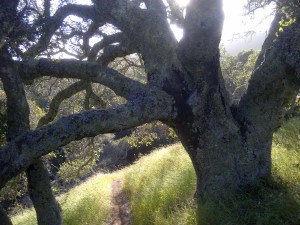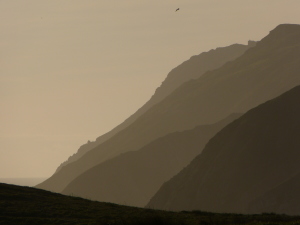Flight
 In my Junior year of high school my buddy, Brad Watson, discovered a rope swing, an outrageous ropeswing, in a steep canyon below Holmes Point Drive.
In my Junior year of high school my buddy, Brad Watson, discovered a rope swing, an outrageous ropeswing, in a steep canyon below Holmes Point Drive.
“It’s radical,” he kept saying. “Radical! You gotta do it!”
So one lunch period we piled into my 64 Rambler station wagon and sped over there. We found the steep trail down into the cedars and madrones and came to a platform built like a diving board sticking straight out into the canyon. A long, thick rope hung from the outstretched branch of a huge maple growing up from the bottom of the gorge. The rope was pulled up almost horizontal and hitched to the diving board just waiting for somebody to grab it, leap out from the board, get their feet onto the big knot and swing down into the canyon. Brad went first, screaming as he fell and shrieking as he swept up the far slope. After a dozen swings back and forth to lose momentum, he dropped down onto the forest floor. Then he panted up the steep hill, dragging the rope behind him. Brad handed the rope up to me.
To say I wasn’t scared would be lying. The fall seemed almost vertical off the diving board, but I had just seen evidence that a boy could live through this fall, so I leapt. My stomach came up into my throat as the rope caught me and swung me down deep into the canyon. As it whipped me back up the other side, my stomach fell to my pelvic floor, yet somehow it was an ecstatic experience. It was radical. It was like flying.
Brad’s mom had become a friend of mine, too. We could talk, about life. I stayed in touch with her and many years later, when she was an old woman, and I no longer a boy, I went to visit her.
“Did you drive up?” she asked.
“No, I flew.”
“Oh,” she said, “your arms must be really tired.
How did she know? I loved to fly. Particularly back then, when I was young. I flew in my dreams all the time. For decades I’d been flying, using my arms! I always thought I was awake, of course. There was no doubt. It was obvious. I would walk out onto the back yard alone, knowing that no one could follow me into the sky, feeling a sense of rare power in this. I would look around, then leap up into the air, and with a combination of will power and strenuous arm flapping I would gain altitude, little by little, higher and higher. A few hundred feet up I could interlace my fingers and thrust my arms forward, and again using the force of my will, would propel myself through the sky. With practice I got better and better.
The landscapes were astonishing, vast. Plunging canyons to catapult down into, towering cliffs, mountain faces I’d soar along in the mist, snowy peaks I’d navigate between beneath wild blue-black skies and intensely clear air. Sometimes jungles or crashing rivers.
Daytimes, to relieve the monotony of terrestrial existence, I would climb trees, or spend hours after school in my high platform tree house hanging between the cedars. I was a boy scout and I loved nothing more than being in the mountains. Once, coming up to the summit of a long steep trail, after an ascent that had almost killed us all, I looked out over the spreading view. Mountains in all directions. I suddenly had the sensation that I was flying out to all those peaks at once, touching and sweeping over all I could see simultaneously. That was life-changing.
We always spent the holidays with family friends. Mr. Petrie, his eyes closed behind bottle-thick glasses, every year fell sound asleep after the Thanksgiving meal, his mouth dropping open and emitting explosive snores. Mr. Petrie took me up flying in a two-seater plane when I was 14. You wouldn’t think he would have been a pilot, but he was.
“Mr. Petrie, I said, we are heading straight for that cliff!”
Glancing up from his maps, he pulled his glasses up from the tip of his nose.
“Oh, so we are.”
He pulled up on the rudder and the plane swung sharply upwards, headed steeply into the blue. As the motor began to groan, he swung the nose to the left and then down and we swooped now as shockingly earthward as we had climbed skyward. It was exhilarating. Far from afraid, I was thrilled by the sensation of flight.
“Thanks,” he said, and we continued on.
That night, lying in bed, I kept reliving the plane’s upswing, gravity and momentum shoving me hard back into the plane’s seat, and then the roller-coaster plunge, a near freefall of pure exhilaration.
As my teen years progressed, life began to deliver blows. My father died of a heart attack. My brother got into serious trouble with the law. My mother was diagnosed with cancer and I fell in love and was forced in the interest of self-preservation to keep my feelings secret. There were sad days, sad months, and sad seasons. Yet I could still fly! The land and the mountains were still big and the sky still open and wondrous. I tried to keep my feet and my wings in the larger terrain of nature’s goodness. It helped me navigate the human terrain with a little less desperation, a little more calmness and hope. Something, at least, was sure.
Standing in high places I always had the instinct to leap into the air, knowing I should be able with enough will power to sail up into the sky. I sometimes felt the desire to leap out from the edges of cliffs. Sometimes I would jump up into the air, just to test that indeed I was awake. I quickly came back down. I was. At least I avoided tragic mistakes.
When I was 24 I built a cabin of logs I cut by hand and salvaged lumber, using a bow saw. The cabin was placed on the steep canyon slopes of the Yuba River in the Northern California mountains. The hillside was so steep that the far edge of the cabin floor platform was supported by poles 14 feet high. Out my windows, that I couldn’t afford to put glass in – and because of this was forced to stave off constant raccoon attacks – I looked 2000 feet down into the canyon. I could also look up the canyon and see the river winding higher and higher into the mountains. At night the river sang up to the brilliant stars and the sky stretched infinitely above me. Sometimes the wind raised the trees’ voices. I listened to their whoosh and sway, their creak and whisper. In calm moments I could hear the river singing far below. Could never make up my mind which of the voices I liked best.
In the Yuba I delighted in swimming downstream with the current, holding my breath under water, eyes open, watching the grey-golden boulders and stones sweep beneath me as the current carried me swiftly over them, around them, through them. It was like flying.
Perhaps I became a storyteller because there is so much magic in it, so much flight. Time and distance are no obstacle, new cultures and tongues not barriers, but open doors inviting us to soar into them. The flight of words, the flight of imagination, the leap of the heart towards curiosity and sympathy, the sudden openings into the minds and feelings of others, flights over the landscapes of loss, the landscapes of love, of courage, of nobility, of surprise and the impossible. Flight on the wings of words.
 My days are less laden now with fancy than with duty, and I have learned to be a good, responsible grown-up, nurturing robust lists. Yet I have never given up flying. There are new landscapes now. My imagination carries me into the hearts of trees as I drive, up the trunks and out the limbs with their watery breath, and it carries me into the days and nights of the homeless hunchback woman I see about town, year after year, aging as I am, and into the hearts of my wealthy clients, and their very ordinary yet lovely concerns and sadnesses. In the mornings, before getting out of bed to start my duties, I soar in my eyes-closed imagination over the coastal hills and trace the contours of the waves along the shore. I curve down into the redwood glade and breathe the damp sweet air between the limbs and trunks. I play for a bit with the ravens, my cousins, upon the wind. And then I brush my teeth and go to work.
My days are less laden now with fancy than with duty, and I have learned to be a good, responsible grown-up, nurturing robust lists. Yet I have never given up flying. There are new landscapes now. My imagination carries me into the hearts of trees as I drive, up the trunks and out the limbs with their watery breath, and it carries me into the days and nights of the homeless hunchback woman I see about town, year after year, aging as I am, and into the hearts of my wealthy clients, and their very ordinary yet lovely concerns and sadnesses. In the mornings, before getting out of bed to start my duties, I soar in my eyes-closed imagination over the coastal hills and trace the contours of the waves along the shore. I curve down into the redwood glade and breathe the damp sweet air between the limbs and trunks. I play for a bit with the ravens, my cousins, upon the wind. And then I brush my teeth and go to work.
My mother just turned 90. She cannot walk anymore and has gone completely blind. She’s in bed most of her days, months and years. Yet, she is an expert flyer.
“Oh, it’s fine,” she says, “I can see perfectly well in my dreams, and in my imagination. I can even read!” And she smiles a big, delighted smile, her blind eyes sparkling. How can she spend all those hours in bed and stay so content and fresh and cheerful? It’s because she’s not there, at least not only there. She knows how to fly.
Read More about Words of the Land